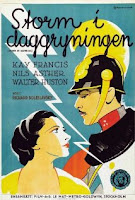We always enjoy Robert Montgomery, and he is very good in what is essentially a minor role. Sure, he’s the romantic lead, but as we mentioned, this is Letty’s story, not his. Mr. Montgomery is able to bring Jerry to a higher level - he gives him an inner strength that is crucial to the film’s ending. Interestingly, he was not the first actor considered - Robert Young was also considered for the part.
There is nothing in the least attractive about Nils Asther’s Emile. He’s a bully, abusive, and a stalker. If we were supposed to have any sympathy for his passion for Letty, it’s pretty much gone when he shows up at the dock in New York. Nils Asther started his Hollywood career during the silent era, when his strong Swedish accent didn’t matter. While his career continued into the talkies, it was limited to playing foreigners, like the General in The Bitter Tea of General Yen (1933). He would continue in films and television until 1961. Briefly married to Vivian Duncan, the couple had one daughter. Mr. Asther died in Sweden in 1981 at the age of 84.
The film makes a nice counterpoint between the relationships of Letty and her mother to Jerry's loving and affectionate parents (played by Emma Dunn and Walter Walker). We do have a brief scene with them and Letty - Ms. Crawford again nicely shows the longing Letty feels for such a family dynamic without being over-the-top.
Letty's true mother is played by her maid and confidant, Miranda (Louise Closser Hale). She sweet, if at times a bit muddled, but her affection for Letty is very clear from the start of the film, and her desire to get her charge to a better place is also obvious. Ms. Hale is a delightful actress, with great range; this film shows another aspect of her talent.
Finally, Lewis Stone (John J. Haney) drops in as a policy investigator towards the end of the film. He's not very bright, and is rather superfluous to the story. The scene itself IS necessary to mend a bunch of fences, but Haney is a head-shaker of a police officer.
The New York Times review by Mordaunt Hall was negative; however, the picture was popular - Letty's white dress becoming a fashion sensation. When the studio attempted re-release, a lawsuit followed (for more information, the AFI catalog details the particulars), and the film was eventually relegated to the archives. Letty's story may have been influenced by the murderer Madeleine Smith. Her story made the screen in 1950 in the David Lean film Madeleine with Ann Todd as the notorious Ms. Smith
We'll leave you with this scene of Letty and Jerry falling in love. Here's hoping the film is eventually able to be re-released with a decent print.











